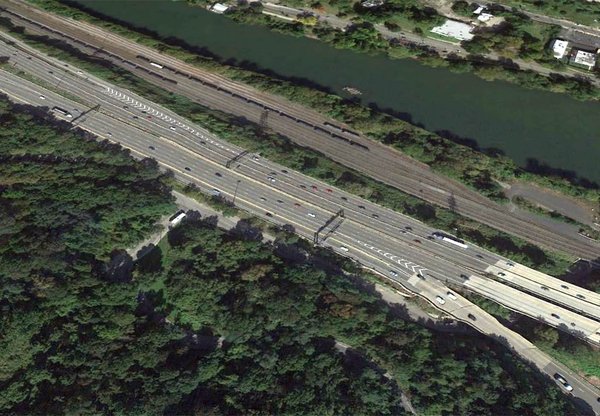Philadelphia highways claimed two spots on a new list of the 50 worst traffic bottlenecks in the nation.
The study, titled "Unclogging America's Arteries 2015" and released by the Highway Users Alliance, took a look at highways across the country to identify the worst places for traffic congestion as measured by hours of delay.
On a list topped by a Chicago bottleneck, and dominated by congested highways in California and the New York metropolitan area, the Schuylkill and Vine Street Expressways were recognized for delaying area commuters a million hours a year – in total.
The 0.8-mile stretch of I-76 between City Avenue and the Roosevelt Boulevard, came in at No. 36 on the list, with an estimated total delay of 700,000 hours annually. The study says the annual value of that lost time to the economy is $16 million, with 263,120 gallons of fuel wasted annually.
The Vine Street Expressway also made the list, at No. 47. The bottleneck on the 0.3-mile stretch of I-676 between the Schulkill Expressway and North 24th Street resulted in an estimated delay of 300,000 hours annually, the study said, carrying annual costs of $6 million of lost time and 112,580 gallons of fuel.
The annual negative impact of the workday slog in and out of the city on I-95 escaped inclusion on the list.
Known locally as the "Surekill Expressway," I-76 has suffered from chronic traffic congestion for decades. The four- to eight-lane highway carries more vehicles than any other in Philadelphia – and any in the entire state – with an average of 163,000 vehicles daily in the city. The Montgomery County portion is used by an average of 109,000 vehicles daily.
Built from 1949 to 1959, much of the expressway was not built to contemporary standards, and the roadway's location have pretty much prevented efforts to widen or upgrade the highway. Over the years, it has been the scene of many vehicle accidents and fatalities.
A double-decker proposal for "the Schuylkill" was even floated when Ed Rendell was governor of Pennsylvania. The necessary funding never materialized.
Rendell, co-chair of Building America's Future, reacted to the study in a statement.
"As millions of Americans get ready to make their way home for Thanksgiving they need to pack their patience along with their bags," he said. "As this study ably demonstrates, gridlock and bottlenecks have significant impact on our economic competitiveness and quality of life.
"There is no one magic solution," he continued. "It's going to take a combination of intelligent technologies and investments in infrastructure to get traffic moving more efficiently. I know that travelers are frustrated with these bottlenecks and traffic delays, and one of the best ways for Americans to ensure they are heard is by communicating this frustration directly to their Member of Congress."
Building America's Future, Rendell said, has created a free mobile app, I'm Stuck, for commuters to ask their congressional representatives to work on solutions to gridlock.
"We know what the problem is and what's causing it – now, we need a Congress who is willing to take long-term action to fix it," he said.
The worst bottleneck in the nation is on the Kennedy Expressway (I-90), the main access route to the city of Chicago from its north and northwest suburbs. Congestion occurs throughout the day in both directions, causing daily total delays on this 12-mile stretch to add up to almost 17 million hours annually. The lost value of time across all drivers experiencing delays amounts to $418 million every year.
The study, which used observed vehicle speed data on workdays from 2014 to identify the bottlenecks, highlights the major benefits of fixing them. In addition to improving mobility and quality of life for motorists, fixing the top 30 bottlenecks alone would, over 20 years:
• Save $39 billion due to lost time
• Save 830 million gallons of fuel
• Reduce more than 17 billion pounds of greenhouse gas emissions (CO2)
• Prevent 211,000 vehicle crashes

